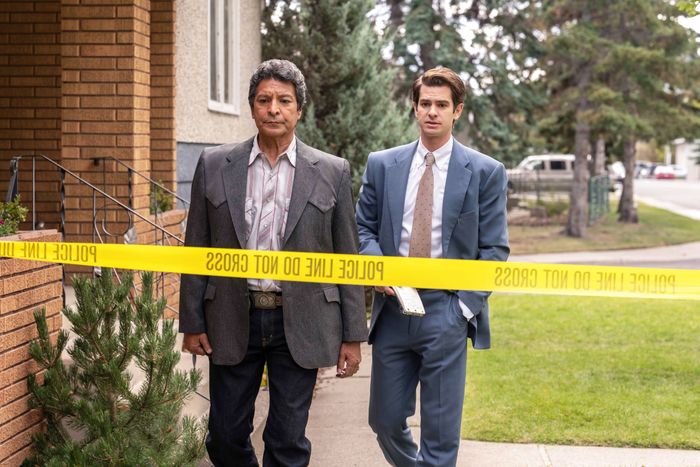
Under the Banner of Heaven, the series adaptation of Jon Krakauer’s lauded 2003 nonfiction book premiering on FX on Hulu today, is primed to fit into well-worn grooves in your TV brain. It is a somewhat fictionalized true-crime story (check); it is about fundamentalist Mormonism and cult dynamics (check) tied to the roots of contemporary extremist politics (chagrined check); it is a show with a sad, grim, and determined primary detective (check) whose relationship to his partner, backgrounded by Utah’s rural wildness, has strong echoes of True Detective (ding ding ding, it’s a prestige-TV bingo!).
If “it often feels like True Detective” makes your ears perk up or “murder among the Mormons” is a tagline that speaks to you, then Under the Banner of Heaven will get the job done. Better than that — it will fulfill those needs handily, even gracefully. In spite of its overfamiliar rhythms and fancy murder-show aesthetics, there are elements of Under the Banner that achieve something distinct and idiosyncratic. For the most part, though, it is one of those series superficially intended to alarm and overwhelm, a true-crime adaptation that should rattle us to our core and make us reexamine our assumptions about violence and masculinity, etc., etc., etc. In practice, I suspect much of its audience will watch for opposite reasons: the weird comfort of the dark murder show and the particular satisfaction of witnessing an unusually heinous crime in a remote, long-ago place and time.
The most significant adaptation choice is the role of Detective Jeb Pyre, played by Andrew Garfield. The original text explores a 1984 double murder in Utah and the long, twisting history that produced both mainstream Mormonism and its modern-day fundamentalist splinter organizations. Krakauer’s narrative comes from historical research and interviews with primary participants and fundamentalist believers; it is much less focused on law-enforcement figures and the mechanics of crime-solving. Garfield’s Pyre — clean-cut, family-focused, a devout Mormon who believes in American government and the rule of law — is a creation for TV and a one-man foil for the whole dark weight of fundamentalist Mormonism. He is at the center of the story and often acts as its implicit narrator. When the camera twists through a gruesome crime scene, it’s Pyre’s horror we’re meant to register. When secrets about early Mormon doctrine appear as facets of the investigation, we’re meant to feel Pyre’s alarm, to sympathize with the way he’s haunted by stories of early LDS pioneers.
Pyre may fit into the story too neatly. There’s a palpable mathematical precision to the way his wholesome earnestness stands in opposition to the unhinged Lafferty family, members of which are both victims and suspects. Pyre is specifically designed as a counterpoint for the eldest two brothers, Dan and Ron (Wyatt Russell and Sam Worthington); the balancing act between mainstream Mormonism and the fundamentalist fringe is perhaps too clean. But Pyre’s blunt fictional functionality is masked by Garfield’s almost flagrantly tender portrayal: He is so good, so very, very sweet, so sensitive to violence and yet so firm in his principles. The broader arc of his character fits roughly into all the hoary wounded detective tropes, yes, but beat to beat, Garfield gives Pyre a softness that makes his iteration fresher and more well-defined. And it makes his partnership with Detective Taba (Gil Birmingham) similarly appealing, a pairing that resists simple “good cop, bad cop” or “veteran, rookie” oppositions.
Let us now sing the praises of Gil Birmingham. In a show about a bloody, horrific crime within an insular community, a story rooted in Mormon ideology that ranges from clean-as-a-whistle family wholesomeness to self-righteous anti-government violence, there is Bill Taba. He is all the humor, all the incredulity, all the skepticism and wisdom. He has to play the outsider, of course, and Birmingham supplies ample side-eye, wisecracks, and frustration with the cloistered, close-knit Mormon communities. But Birmingham, perpetually the supporting-role character actor in big series like this, is far too skilled to let Taba function merely as a hard wall to Pyre’s softness. He brings an inquisitive, generous curiosity, and when the two warm up to one another, their relationship feels like friendship rather than cold story mechanics. Every scene is better with Birmingham in it.
The weakest part of the series, though, is the flashback story line relaying the history of the early Mormon pioneers. It’s a much more prominent element of Krakauer’s book, where it’s given enough time and care to shape the narrative in concert with the modern murder plot. Here, the flashbacks are either too much or not enough. All the energy and individuality of Pyre’s characterization are absent from the depiction of figures like Joseph Smith and Brigham Young. They are men with hats and collars, gesticulating angrily or falling to their knees in prayer. Whatever humanity or personality we are supposed to glean from them is entirely absent, and that’s even more true for the women. Yes, the flashbacks are pervasive enough that they weigh on the show like pedantic lesson plans. The 19th-century story needed to be either greatly reduced or forced to stand on its own two feet. As is, it’s an unwanted hitchhiker.
Nevertheless, I found myself sailing through the first five episodes (of seven total) provided to critics for all the reasons prestige crime dramas about terrible murders in narrow, far-off communities tend to appeal. There’s a perverse relief in insularity — as long as you can assure your own safety on the other side of the wall. That always entails some willful blindness to the darkness, extremism, and violence that lives much closer. But that’s also why Under the Banner of Heaven’s Pyre is such a smart creation. He is so shocked and so upset. For a while, we get to share his naïve horror.
More TV Reviews
- Meghan Markle Pioneers New Frontiers in Unrelatability
- Marvel Won’t Let Daredevil: Born Again Live
- We Were Too Hard on Winning Time


